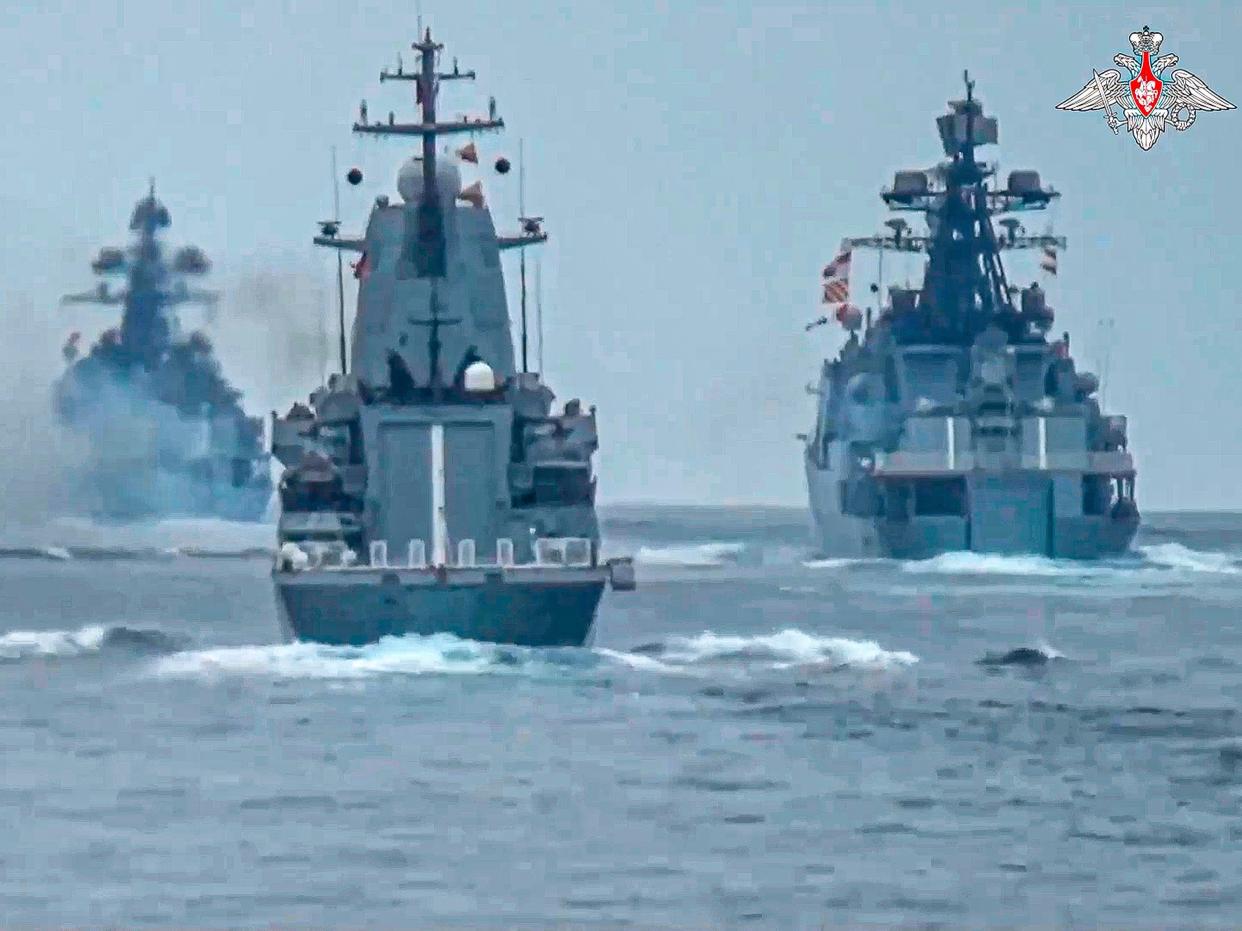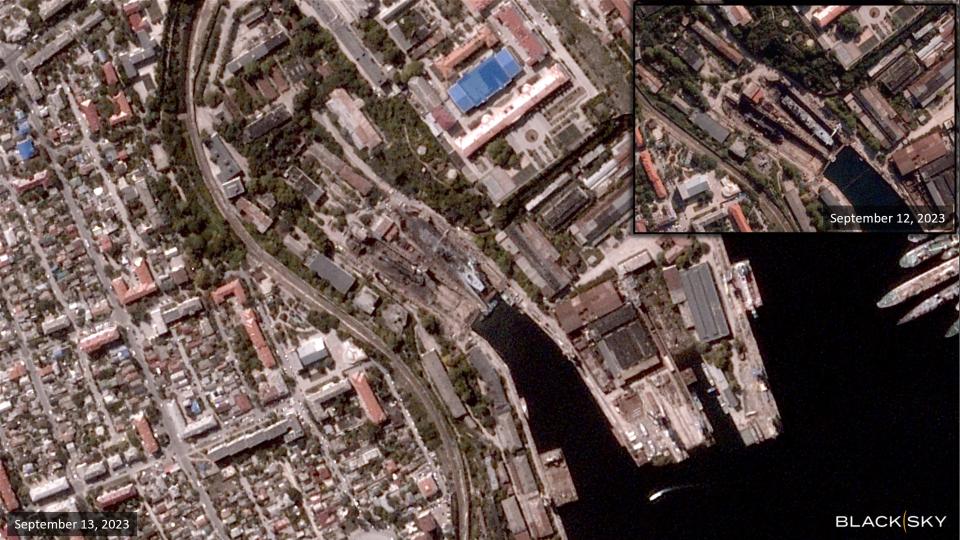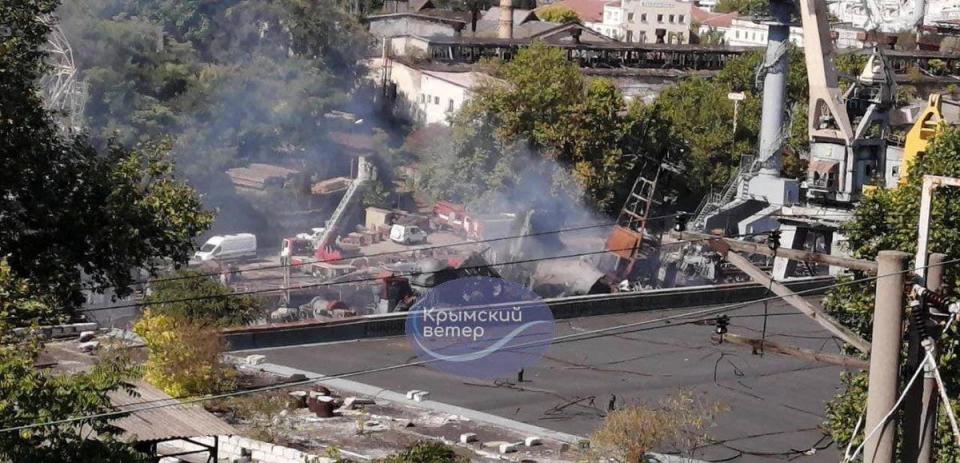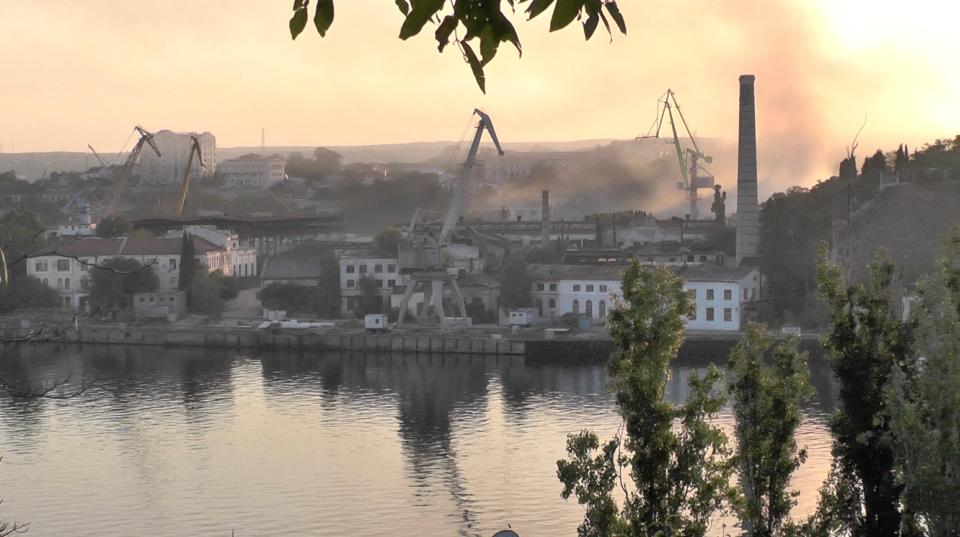A spectacular attack in Crimea is part of Ukraine's effort to 'evict' Putin's navy from a prized Black Sea base, experts say

Ukraine carried out a massive attack Wednesday on a Russian shipyard in Crimea's Sevastopol.
The cruise missile strikes appear to be part of Kyiv's effort to weaken Russia's grip on the strategic naval base by diminishing its usefulness.
The attack also deals a harsh blow to the logistics and operations of Moscow's Black Sea Fleet.
Russia's Black Sea Fleet has relied heavily on a strategic naval base and shipyard located on the occupied Crimean peninsula to help sustain its invasion of Ukraine, but a recent attack could jeopardize operations.
Ukrainian forces bombarded the port in Sevastopol this week with cruise missiles, damaging two ships and some of the surrounding facilities. It is the latest demonstration of Kyiv's longstanding effort to expel Russian forces from a prized naval base. Experts say the attack on the shipyard also dealt a harsh blow to Russia's maritime logistics, performance, and survivability in the Black Sea, as Moscow lacks the capacity to effectively service its navy elsewhere in the region.
"This attack is a major success for Ukraine," Michael Petersen, the director of the Russia Maritime Studies Institute at the US Naval War College, told Insider. "It's another blow to Russian seaborne logistics operations."
In a pre-dawn attack on Wednesday, Ukraine's air force fired 10 cruise missiles — which observers speculated were Western-made Storm Shadow/ SCALP-EG long-range cruise missiles — at the shipyard in Sevastopol. Russia's defense ministry said in a Telegram statement, the details of which have not been independently verified, that its air-defense systems managed to down seven of the missiles. The missiles that made it through inflicted damage on the landing vessel Minsk and the attack submarine Rostov-on-Don, which were both undergoing repairs. The ministry also said it destroyed three sea drones launched by Ukraine.
After the strikes, the Ukrainian air force thanked its pilots for what it said was "excellent combat work" while a top official in Kyiv called the strike on Sevastopol a "professional and meaningful" statement.
Satellite imagery obtained by Insider captured the shipyard before and after the attack, showing clear damage to the repair facility. The extent is unclear, although some videos published to social media on Thursday show significant destruction. If the damage to the base is severe enough, it may impair the Black Sea Fleet's readiness. The loss here could be more than a couple of warships.

"The apparent destruction of the two vessels will likely render the dry dock inoperable until Russian forces can clear the debris, which may take a significant amount of time," experts at the Institute for the Study of War (ISW), a Washington-based think tank, wrote in a Wednesday analysis. They added that any damage to the Black Sea Fleet's main repair facilities "will likely have reverberating impacts in the event of further Ukrainian strikes on Russian naval assets," which are becoming more regular targets for the Ukrainians.
'Potentially a major strategic blow'
Sevastopol is the longstanding headquarters of the Russian Black Sea Fleet and was a key part of the Crimea peninsula that Moscow illegally annexed in 2014. The shipyard there is home to a majority of the fleet's repair and logistics infrastructure, making it crucial in helping Russia maintain its vessels, which have been responsible for countless devastating missile strikes on Ukrainian cities and infrastructure since the full-scale invasion began in February 2022.
Beyond Sevastopol, the Black Sea Fleet doesn't have many alternative options when it comes to repairs and upgrades. Russia's shipbuilding sector has long been plagued with issues, and the problems have only worsened since Moscow invaded Ukraine last year, thanks to Western sanctions and previous Ukrainian attacks on Sevastopol — which Kyiv has targeted multiple times — and on assets and positions around the Black Sea.
Petersen, an expert on Russian naval operations and strategy, said Russia could use floating dry docks in the port city of Novorossiysk, which has also been targeted in the past by Ukrainian sea drones, but these facilities may be overwhelmed by backlogs, making any facility losses at Sevastopol a problem. He said that the attack on Sevastopol "is potentially a major strategic blow" to the Russians.

"Russia just doesn't have enough dry docks and floating dry docks to service and repair its navy and its fleet of civilian vessels," Petersen said. "If the dry dock is severely damaged and needs repairs itself, the ship maintenance and repair schedule will be delayed worse than it has been already in the past few years."
Petersen said the strikes could also have an impact on Russia's naval headquarters and shipyard operations by reducing the willingness of headquarters staff and yard workers to go into work. Indeed, Russian state media reported that two dozen people were injured in Wednesday's attack. But still, he said "it would be a major political defeat to fully relocate the fleet headquarters, and it's almost impossible to fully relocate the repair infrastructure at the base."
Ben Hodges, a retired lieutenant general and former commander of US Army Europe, said attacking the Sevastopol shipyard highlights the "sophistication" of the Ukrainian military's attack planning. Maintenance facilities are high-value targets to pursue, he noted, because losses make it difficult for the enemy to keep ships "operating at peak effectiveness" for extended periods of time.

"You can sink ships, and eventually if you were able to sink them all, obviously that's good," Hodges told Insider. "But in this case, to destroy — or severely damage — a maintenance facility, it has a much more significant longer-term effect on the ability of Russian forces to continue to do things."
Raising the cost for Moscow
The Sevastopol strikes came on the heels of several other recent high-profile Ukrainian hits on strategic Russian targets in and around Crimea. These included the destruction of a formidable air-defense systems, a daring amphibious raid, sea drone attacks on a key bridge, and the capture of oil drilling platforms that were seized by Russia years ago and used for what Kyiv asserted was "military purposes."
All of these actions are part of a lengthy pressure campaign designed to make Crimea — which Kyiv has vowed to liberate from Russian occupation — "untenable" for Moscow's forces, Hodges told Insider. The attacks, he said, are one aspect of Ukraine's larger and multi-domain counteroffensive effort, which also includes the Ukrainian military's fight against Russia's defensive lines in the eastern and southern regions.
"At the operational level of war, it appears that part of Ukraine's strategy is to impose cost on Black Sea Fleet operations. The logic appears to be that if the Black Sea Fleet wishes to operate out of Sevastopol, then it will pay a heavy price to do so," Petersen said. "At the strategic level of war, the goal of course is to evict Russia from Crimea altogether. These operational and strategic goals are nested."
"One way to evict the Black Sea Fleet from Sevastopol is to raise the cost to such levels that Moscow decides that it can't or doesn't want to pay it anymore and withdraws the fleet," he said. Russia previously relocated some of its ships from Sevastopol to Novorossiysk after a naval drone attack last fall, and now new attacks are threatening vessels in maintenance and key facilities.
Despite these efforts to deny the Russians safe harbor and drive the Black Sea Fleet from Sevastopol, Petersen cautioned that "the chances of this happening without extraordinary Ukrainian success on the ground are vanishingly small."

It remains to be seen what specific long-term effects on the Black Sea Fleet arise in the aftermath of the Sevastopol strikes. Petersen hailed the attack as successful for Ukraine, and compared its military significance to when Kyiv's forces sank the guided-missile cruiser Moskva with anti-ship missiles in April 2022.
Damage to the landing vessel Minsk reduces Moscow's military sea-lift capabilities, while damage to the attack submarine Rostov-on-Don potentially disables — at least temporarily — a powerful missile-firing and mine-laying vessel that Ukraine had no way of locating while it was at sea, he said, adding that "if the dry dock is also damaged, that's an impressive three-in-one attack."
Read the original article on Business Insider


